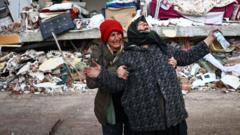As the conflict between Israel and Iran escalates, both nations have intensified aerial attacks, with Israel targeting Iran’s energy infrastructure while Iran retaliates with missile strikes on Israeli cities. The ongoing violence raises concerns about international tensions and impacts on global energy supplies.
Escalation in Israel-Iran Conflict: Aerial Attacks Intensify

Escalation in Israel-Iran Conflict: Aerial Attacks Intensify
Israel has expanded its military operation against Iran, targeting critical oil and gas facilities in response to ongoing missile exchanges, raising fears of broader regional implications.
---
DATE: June 14, 2025, 3:50 p.m. ET - As aerial military exchanges between Israel and Iran continue unabated, Israel has dramatically escalated its offensive tactics, now aiming at Iran's vital oil and gas industry, which is essential for the nation's economy. This latest surge comes amidst a fierce exchange of missile and drone fire between the two adversaries that has seen both sides enduring heavy casualties and structural damage.
Official reports indicate that after initially focusing on Iranian military and nuclear installations, Israel shifted to target energy facilities, including the crucial South Pars gas field and refineries in Bushehr province. A significant fire was reported at the gas field, leading Iranian officials to respond with alerts and emergency protocols to protect their energy sector, already under strain from international sanctions.
Israeli military actions have reportedly resulted in the deaths of over 70 individuals, including high-profile Iranian military leaders involved in the nuclear weapons program, prompting Iran to retaliate with missiles targeting major Israeli urban centers. Iranian officials claim to have launched a substantial number of missiles aimed at Israel, claiming partial success but experiencing casualties in the process, with estimates up to 78 Iranian casualties cited.
Reports suggest that the airstrikes mark the most intense hostilities between the two nations in decades, igniting concerns that the conflict could escalate beyond regional implications, potentially engaging other major powers, including the United States. Talks that were scheduled to recommence aimed at curbing the Iranian nuclear program have been canceled in light of the ongoing hostilities, worsening the potential for diplomatic resolution.
Prime Minister Netanyahu's government has vowed to continue strikes, ensuring targets across Iran feel the impact of Israeli military capabilities. He stated that the Israeli Air Force would not relent until the threats posed by Iran are neutralized, further signaling an intended prolonged conflict.
Amidst chaos, residents in both countries are being adversely affected—Israeli citizens face sheltering in bomb-proof rooms while those in Iran report significant destruction in urban areas impacted by missile strikes. Communities within the Israeli-occupied West Bank call attention to their vulnerability, lacking improvements in civil alert systems for incoming threats compared to their Israeli counterparts.
As military actions unfold, the global community watches closely, with both countries attesting to the volatility of the situation. Any substantial damage to Iran's energy infrastructure could exacerbate already delicate oil markets globally, impacting supply lines and economic stability. The crisis underscores how quickly regional skirmishes can escalate into broader confrontations, amplifying concerns among international observers.
DATE: June 14, 2025, 3:50 p.m. ET - As aerial military exchanges between Israel and Iran continue unabated, Israel has dramatically escalated its offensive tactics, now aiming at Iran's vital oil and gas industry, which is essential for the nation's economy. This latest surge comes amidst a fierce exchange of missile and drone fire between the two adversaries that has seen both sides enduring heavy casualties and structural damage.
Official reports indicate that after initially focusing on Iranian military and nuclear installations, Israel shifted to target energy facilities, including the crucial South Pars gas field and refineries in Bushehr province. A significant fire was reported at the gas field, leading Iranian officials to respond with alerts and emergency protocols to protect their energy sector, already under strain from international sanctions.
Israeli military actions have reportedly resulted in the deaths of over 70 individuals, including high-profile Iranian military leaders involved in the nuclear weapons program, prompting Iran to retaliate with missiles targeting major Israeli urban centers. Iranian officials claim to have launched a substantial number of missiles aimed at Israel, claiming partial success but experiencing casualties in the process, with estimates up to 78 Iranian casualties cited.
Reports suggest that the airstrikes mark the most intense hostilities between the two nations in decades, igniting concerns that the conflict could escalate beyond regional implications, potentially engaging other major powers, including the United States. Talks that were scheduled to recommence aimed at curbing the Iranian nuclear program have been canceled in light of the ongoing hostilities, worsening the potential for diplomatic resolution.
Prime Minister Netanyahu's government has vowed to continue strikes, ensuring targets across Iran feel the impact of Israeli military capabilities. He stated that the Israeli Air Force would not relent until the threats posed by Iran are neutralized, further signaling an intended prolonged conflict.
Amidst chaos, residents in both countries are being adversely affected—Israeli citizens face sheltering in bomb-proof rooms while those in Iran report significant destruction in urban areas impacted by missile strikes. Communities within the Israeli-occupied West Bank call attention to their vulnerability, lacking improvements in civil alert systems for incoming threats compared to their Israeli counterparts.
As military actions unfold, the global community watches closely, with both countries attesting to the volatility of the situation. Any substantial damage to Iran's energy infrastructure could exacerbate already delicate oil markets globally, impacting supply lines and economic stability. The crisis underscores how quickly regional skirmishes can escalate into broader confrontations, amplifying concerns among international observers.




















